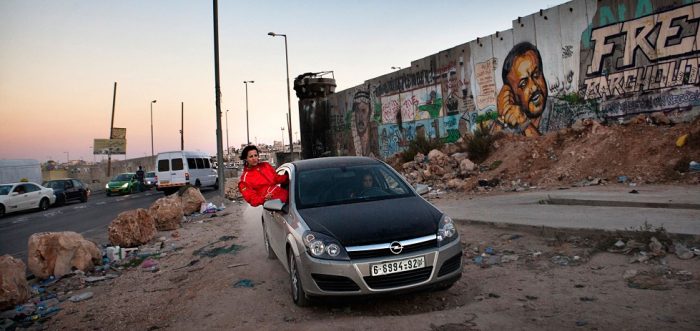Imagine Fast and the Furious relocated to Palestine’s West Bank with an all-girl cast of drivers pitted against Israeli law enforcement. Sounds cool, right? At least that’s how the cheap-seats pitch might go for Amber Fares’ documentary Speed Sisters, which follows the lives of a female Palestinian street racing team as they compete on the West Bank circuit: a makeshift series of tracks operating under the ever-present eye of neighbouring Israeli police and soldiers. That the film is more refreshing than such limited descriptors is both its appeal – there’s little heavy-handed politicking on display – and its undoing – as a gentle celebration, it struggles to put enough meat on even its slender runtime.
Igniting with the sputtering sound of an old BMW engine kicking into life, Speed Sisters drops the audience right into its world of custom cars, which are hurled around improvised courses by a close-knit gang of girls. With multiple cameras mounted on dashes, POV helmets and around the track, Fares captures the scrappy energy of proceedings, bursts of speed metal scoring the punchy, improvisational feel. “I don’t race for trophies,” one of the drivers asserts early on, “I do it for the release.”
That sense of tension is never far from the documentary’s surface. In an environment where it’s uncommon to see women participating in this kind of sport – theirs is the first all-girl racing team from the Arab world – this young band of Palestinian drivers are up against both gender and political pressure. One of the recurring images in Speed Sisters sees boys and men watching the races with a vague kind of bemusement; additionally, there’s a thread of gender intimidation between the racing federation president, a man, and the girls – in one interview, the team captain confesses she often tries to seem less powerful in order to appease her male superior. But, for the most part, admiration appears to override disdain. When a TV host wonders if there was controversy around women racing cars, the team’s sassy blonde driver Betty replies, “on the contrary, Palestinians are proud of us.”
It’s this solidarity through defiance that proves to be one of Speed Sisters‘ greatest charms. Having lived through generations of oppression as refugees in their own homeland, many of the older Palestinian men are surprisingly supportive of the girls’ street racing. Indeed, many of the expected gender stereotypes are flipped. The girls might love the noise and fury of car racing, but they’re also feminine – although the extent to which it’s a cultural necessity to perform typical gender tropes isn’t clear. “I’m a girl, I’m feminine,” insists Betty, Fares’ camera lingering in close-up on her nails being coated a lavish fuchsia. “It’s important for me to show that I’m not a tomboy.” Important how, though? It’s never explored.
Speed Sisters is more confident addressing the familiar political spectre of Israeli occupation, a reality that’s never far from intruding upon the racers’ circuit. Barbed wire walls dividing the two territories form a grim backdrop to several of the driving scenes, while shots of the cars drifting through abandoned lots in circles evoke a clear sense of the cage that is the West Bank. Later, when several of the drivers traveling with Fares’ and her camera crew get a little too close to border patrols, Betty gets hit with a canister of Israeli tear gas and winds up in the emergency ward. “You think because you’re blonde and pretty they’re not gonna shoot you?” dark-haired Noor jokes to her blonde teammate in the hospital. “They just shot you in the ass!” Later, two of the girls’ frolic on a West Bank beach that looks like Surfers Paradise in comparison to their dilapidated home. “They took the most beautiful things we had,” they remark of the Israelis.
Yet the documentary is characterised less by such heavy concerns and more with the day-to-day existences of its protagonists – and that proves to be something of an issue. While there’s no doubt that this is a glimpse into a pretty unique world, many of the girls’ stories, while lovely, aren’t particularly fascinating. The perfunctory childhood anecdotes (she always liked cars as a kid!) only scratch the surface of what really drives them to compete, and further serve to distend a doco that might have been more effective as an hour-long TV piece. When many of the film’s best shots – all involving racing – show up during the closing credits sequence, one wonders whether more of the adrenalized rush of these street scenes (and less middling talking heads) would have made Speed Sisters more compelling.

